Denisovans – 18 foot Human Giants who lived 40,000 years back in Asia
Human history, specially the part where man got the intelligence and ability to develop himself and the surroundings, has been held hostage to the limits of Western religious ideology. For years, historians have been loathe to accept that real development and sophisticated work by man started before the advent of Abrahamic history. That Abraham’s folk-lore and mythology is not the starting point of man’s consciousness. Denisovans and their work is yet another challenge to the accepted mythology that passes off as history in most text books.
#Denisovans - 18 foot Human Giants who lived 40,000 years back in Asia #History #HomoSapiens Click To Tweet
How big were Denisovans
In 2008, an excavation in the Altai region of Siberia unearthed a bone of a small girl and a tooth from an adult individual. As per the DNA testing, the girl had roamed the Earth approximately 41,000 years ago. Interestingly, the tooth was over 2.5 times the human tooth. And, these body parts were from a new species unknown hitherto to historian. A species that lived between 700,000 to 40,000 years ago. The species has been classified as Homo sapiens ssp. Denisova and Homo sp. Altai (where ssp is sub-sub-species and sp is sub-species).
Now what is most interesting is that this species of Homo Sapien was of an unusual size – as much as 3 times a modern 6 ft tall man! It is not easy to fit that big a tooth in a human jaw bone and the size based on the right jaw would take the adult to that size.
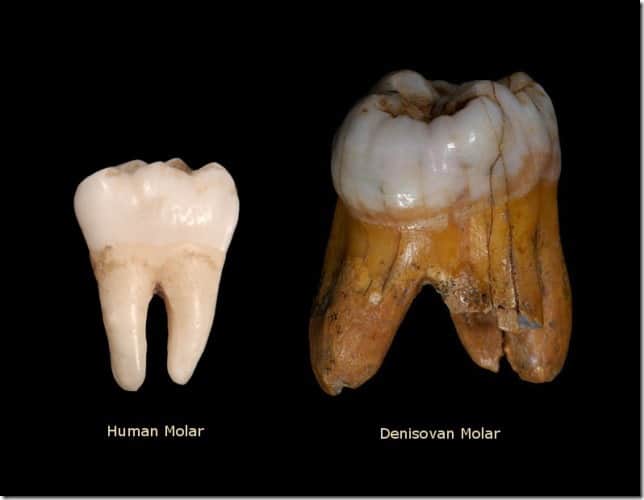
Here is how big the species would have been since the tooth resembled the size of a cave bear.
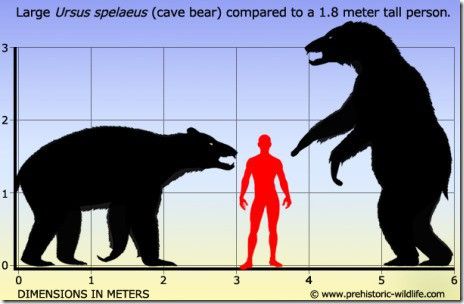
There is another interesting fact about the body and size of a Denisovan. He had a very large brain – compared to humans and Neanderthals. The humans have a brain volume of 1450 cc (cubic centimeters), Neanderthals had 1600 cc while the Denisovans had 1800 cc.
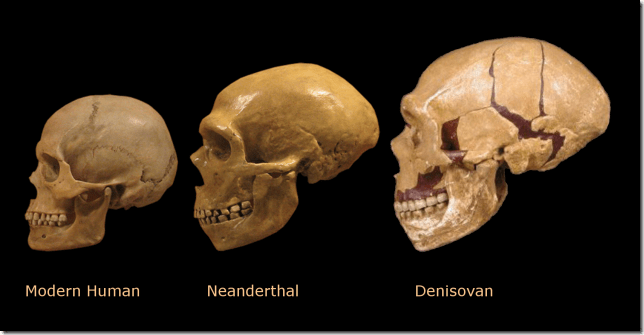
So you see, in many ways, Denisovans were probably the largest Homo Sapiens that roamed the planet. The Denisovans roamed from Siberia to the South-East Asia. The molecular anthropologist Mark Stoneking at the Max Planck Institute for Evolutionary Anthropology in Leipzig, Germany says the following:
“There might be a tendency to think that mating between modern humans and archaic humans such as Neanderthals and Denisovans is a very strange behavior and therefore there must be something unusual or different about populations that engaged in such behavior,” Stoneking added. “Instead, I think the picture we are getting from both this work as well as from analyses of genetic data from all modern human populations is that there are two things humans like to do — migrate and mate — and the product of these two is going to be admixture.”
It therefore seems that Denisovans were mating with the modern humans as late as 40,000 years back. Of course, the Denisovans shared the most – 4-6% – DNA with the Melanesians, which are the people from Papua New Guinea and Bougainville Islanders.
Their analysis shows that, in addition to Melanesians, Denisovans contributed DNA to Australian aborigines, a Philippine “Negrito” group called Mamanwa, and several other populations in eastern Southeast Asia and Oceania. However, groups in the west or northwest, including other Negrito groups such as the Onge in the Andaman Islands and the Jehai in Malaysia, as well as mainland East Asians, did not interbreed with Denisovans.
The Denisovans populated the area around South and South-East Asia primarily.
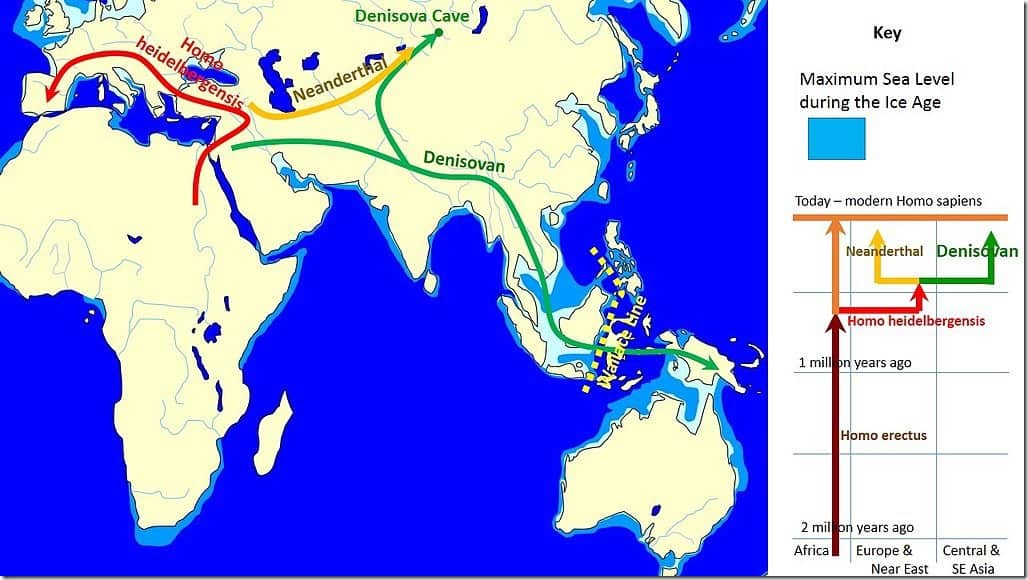
Attribution: John D. Croft at English Wikipedia
Here is how the tribals from New Guinea look like today.
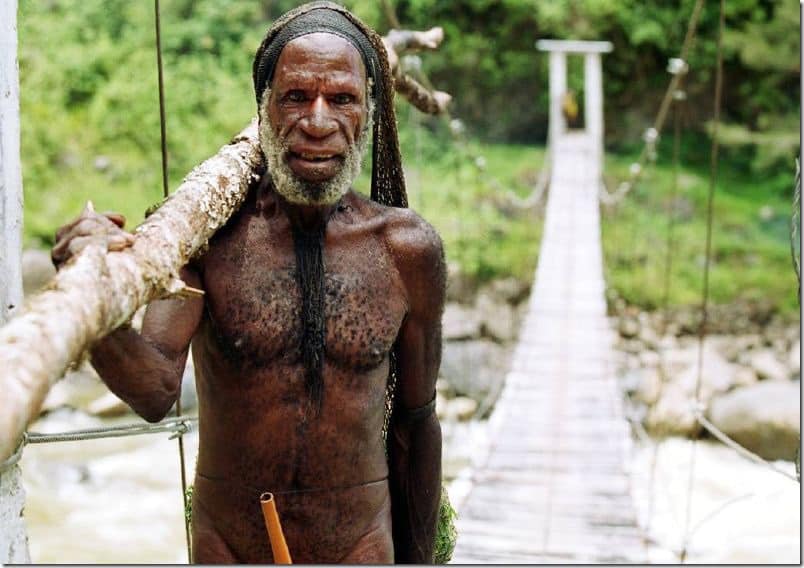
Given how these people have been treated and looked at, one would think that the Denisovans were very basic and tribalistic and did not have much in terms of significant human skill development. Well, that is where things get even more interesting!
Were Denisovans so ‘uncivilized’?
The archeologists have found a bracelet from the Denisovan caves that date back to 40,000 made of Chlorite, which is a stone that reflects sun rays.
‘The bracelet is stunning – in bright sunlight it reflects the sun rays, at night by the fire it casts a deep shade of green,’ said Anatoly Derevyanko, Director of the Institute of Archaeology and Ethnography in Novosibirsk, part of the Siberian Branch of the Russian Academy of Sciences.
The bracelet is made of Chlorite stone that is formed under pressure at high temperature at certain depths in earth. It is not “lying around” here and there and has to mined! It is anyone’s guess as to what a 18 foot large Homo Sapien was doing with jewelry made of a translucent stone that needs to be mined. Right? Well Check out the bracelet pics and then we will discuss something even more shocking! (All the pictures below from Siberian Times)
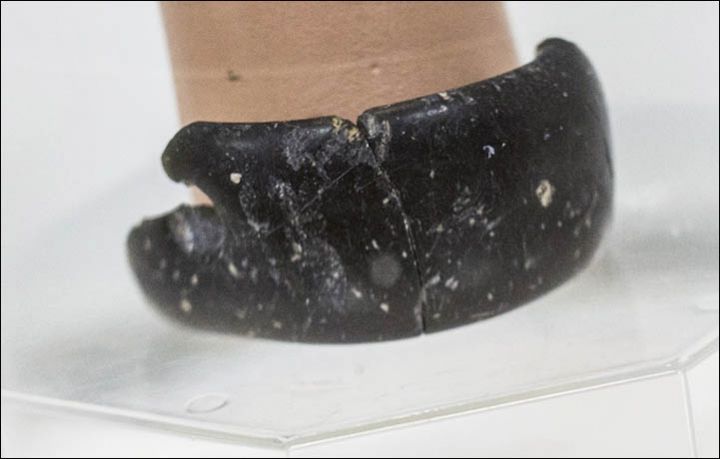
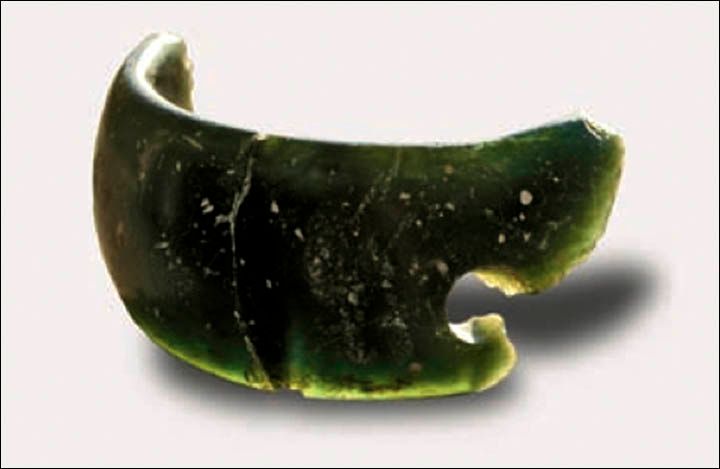
As beautiful as this, there is another aspect that not many look at deeply. You see that small hole on the side of bracelet? Well, that was created by the artisans who made the bracelet. And, it was no mean task to even create it.
Writing in the Novosibirsk magazine, Science First Hand, Dr Derevyanko said: ‘There were found two fragments of the bracelet of a width of 2.7cm and a thickness of 0.9 cm. The estimated diameter of the find was 7cm. Near one of the cracks was a drilled hole with a diameter of about 0.8 cm. Studying them, scientists found out that the speed of rotation of the drill was rather high, fluctuations minimal, and that was there was applied drilling with an implement – technology that is common for more recent times.
Any other way – apart from a high speed drill – would have smashed the rock and no hole could have been created.
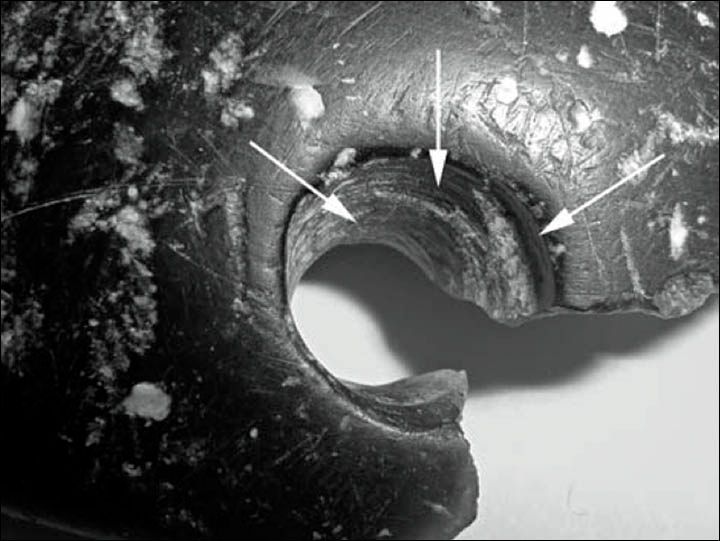
Unfortunately, there is little research being done by scientists to understand the construction of such artifacts in detail. Which is also true of the skill used in pyramids and in many temples around the world. The fundamental question that Denisovans raise for our understanding of history is:
- who were the Denisovans?
- what did they know and how advanced was their knowledge?
- how did they interact with humans and what was their relationship?
Do we know that? If not, then a major part of our knowledge is history is undefined.
Conclusion
There is so much of our history that we do not know. If these huge humanoids were walking this planet over such a large area and interacting with Neanderthals and Homo Sapiens then how was the entire interaction? How did Denisovans ultimately cease to exist?
Featured Image: By Graham Crumb from Port Vila, Vanuatu (Blonde Girl) [CC BY-SA 2.0 (https://creativecommons.org/licenses/by-sa/2.0)], via Wikimedia Commons




Comments ()